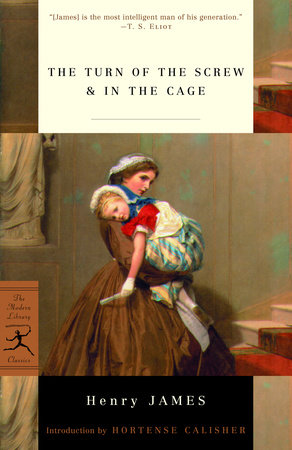The Turn of the Screw & In the Cage Reader’s Guide
By Henry James


1. In The Turn of the Screw, the misbehavior of the children, Miles and Flora, as the story progresses makes us suspect that they are not as innocent as they seem. And yet the source of their misbehavior is left ambiguous: Is it natural mischievousness or has it been instigated by an evil, corrupting force in the form of the ghosts of Peter Quint and Miss Jessel? Trace through the story the changes in the way the governess views the children and their misbehaviors. How does the uncertainty about the children, and their possible awareness of the ghosts, intensify the governess’s predicament?
2. In the beginning chapters of the story, the governess recounts several unsettling events: The children’s uncle insists that he not be bothered with anything relating to the children’s care; we learn of the death of the governess’s predecessor, Miss Jessel; and we learn that sweet and charming Miles has been expelled from school. These are just some of the forebodings that set the stage for the supernatural events that soon follow, and so when the governess first relates the appearance of a ghost it doesn’t seem entirely unexpected. To what degree is the governess a force of sense and reason in these unsettling surroundings, and to what degree does she become a destabilizing force herself as the story progresses? How does our answer to this question affect our understanding of the story’s ending?
3. Any interpretation of The Turn of the Screw hinges on the question, debated vociferously by critics, of whether the ghosts of Peter Quint and Miss Jessel are real or whether they are figments of the governess’s imagination. What are the implications of the governess’s imagining them? If we read this not as an actual ghost story but as a story about the governess’s perceptions of ghosts, what sort of psychological underpinnings are suggested? Could it be in these dimensions that the real horror of the story may lie?
4. The heroine of In the Cage works, literally, in a cage-behind bars in a telegraph office-but lives in a "caged" situation in more ways than just this one. How else is she caged in? She is a highly observant, intelligent woman. What are the effects on her perceptions of reality of her "caged" situation? What are the effects on her use of her imagination and its interplay with reality?
5. In the Cage is one of the few of Henry James’s novels or novellas that center on the situation of a heroine of the lower or lower-middle class. Most often, James’s heroines are members of the upper or upper-
middle class-heroines caught in difficult, even "caged," situations, but situations that are the result of their own moral and emotional choices and these choices’ far-reaching, sometimes unforeseen, impact. The heroine of In the Cage is in large part defined, from the very beginning, by her lack of any choices, a consequence of her low social position. In the heroine’s climactic interaction with Captain Everard, when he comes to Cocker’s to retrieve the lost telegram, how does the heroine make use of the choice open to her at this juncture-that is, the choice of how much to admit to remembering about the telegram? How does she make use of the power that the choice gives her in relation to Captain Everard? Why does she act as she does, and what do her actions say about her attitude toward the Captain?
6. On one of the occasions when the heroine and Mrs. Jordan are discussing their respective clients, Mrs. Jordan says, "Yes, but the great difference is that you hate yours, whereas I really love mine." In actuality, the lines aren’t quite so clearly drawn. Why does Mrs. Jordan make this comment? What sort of complex mix of feelings do the heroine and Mrs. Jordan have for their clients? And for each other? How does James use his heroine’s relationship with Mrs. Jordan to show the complicity of both in upholding the hierarchical social structure within which they live? What are the advantages to them of their complicity?
7. If we make the assumption that the ghosts in The Turn of the Screw are a product of the governess’s imagination, how might we think about the similarities in the imaginations of the governess and the heroine of In the Cage? Is there any sense in which, psychologically-like those of the heroine of In the Cage-the governess’s perceptions create a "caged" situation for her? How do the heroine’s perceptions of Captain Everard and the governess’s perceptions of the children’s uncle similarly contribute to the psychological traps these two characters may, in a sense, lay for themselves?
Just for joining you’ll get personalized recommendations on your dashboard daily and features only for members.
Find Out More Join Now Sign In